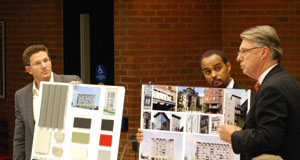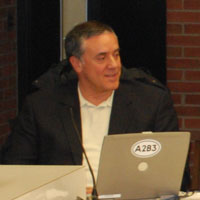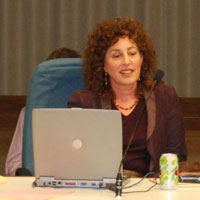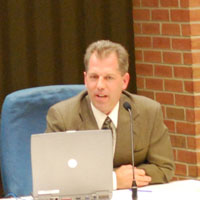Meeting Watch: City Council (6 Nov 2008)
On a night when nobody showed up for public commentary reserved time, council passed the majority of its agenda items with no discussion. Noteworthy exceptions included the City Apartments PUD project (passed), Quickie Burger’s application for a liquor license transfer (postponed), and a decision to go into closed session (passed – with the discussion and dissent by councilmember Marcia Higgins fairly characterized as somewhat lighthearted). The mood was a little more relaxed than is typical, and a bit sentimental, as council said farewell to four of its members: Ron Suarez, Joan Lowenstein, Stephen Kunselman, and Chris Easthope.
City Apartments Background
The PUD proposal by Village Green Residential Properties, LLC at the corner of First and Washington, across from the Blind Pig, includes 156 dwelling units and 244 public parking spaces. Formerly, a city parking structure stood on the lot. That structure was demolished and is currently being used temporarily as a surface parking lot. The project was given approval by the city’s planning commission by a 7-0 vote.
At the planning commission’s public hearing there had been objections to the PUD by neighbors who thought that the building was simply too massive and out of scale. Aside from sheer height, aesthetic objections included the south wall of the building, which would be windowless – a blank wall. This was a design feature that planning commissioner Ethel Potts also lamented in her comments at that meeting. In response to the explanation that building codes prohibited windows in buildings built that close to the lot line, Potts said that it was the developer’s decision to go that close to the line, and that if windows were a priority, the building could have been set back from the line.
A concern was also brought forward by then-candidate for Ward 5 council representative, John Floyd, that the capture by the Downtown Development Authority of the tax increment due to development would result in no extra revenue to the city’s general budget to accommodate the extra burden of the residents living in the building.
Owner of Downtown Home & Garden, Mark Hodesh, also spoke at the planning commission’s public hearing, and expressed his support for the project, but also some frustration on the status of his specific concerns that he’d conveyed previously. Those concerns focused on the alley that runs between Liberty and Washington, splitting the block. When built, City Apartments, including its public parking spaces, will stand on one side of the alley, with Hodesh’s store on the other.
At planning commission’s public hearing, Hodesh raised four specific concerns: (i) trash pickup: how will its timely removal after setting out be assured? (ii) snow removal: who will take responsibility for snow removal in what will become a pedestrian thoroughfare? (iii) lighting: is there adequate lighting to ensure public safety? (iv) traffic in the alley: how will apartment move-in and move-out events be coordinated, given other alley-users’ interests?
Related to the last point (and of interest to downtown development watchers), Hodesh indicated that alley traffic could be expected to increase beyond what City Apartments would add. He said that he had plans of his own to expand in the back of his building, and that Gui Ponce de Leon had plans for a luxury hotel at the south end of the block.
City Apartments Council Discussion
Hodesh’s concerns were raised by councilmember Stephen Kunselman at council last night. Kunselman asked the developers how the concerns of neighboring businesses had been addressed. With respect to the lighting, the developers said that more lighting had been added. They also said that concerns about blocking the alley would be addressed by internal communication to City Apartments residents concerning preferred timing and locations for move-in and move out.
They said they expected about 40% turnover from year to year. So for 156 units, that worked out to 60-62 move-ins/move-outs per year, or 5 per month. The 10 moving events per month, they said, paled compared to restaurant deliveries common in other downtown alleys. Plus, said the developers, they had experience managing 35,000 units across the country: “We know how to do this.” They stressed, however, that they were based here regionally in Farmington Hills, and fully intended to retain this building permanently.
Councilmember Mike Anglin Stephen Kunselman asked if the plan was to lease by the unit or by the bed. Answer: by the unit. This is not a student housing development, the developers said, while emphasizing that they would be happy to rent to students – as long as the students were interested in renting a whole 1-bedroom, 2-bedroom, or whatever-sized unit.
Councilmember Chris Easthope asked why brick was not chosen for the facade, instead of the corrugated metal. Easthope pointed out that the predominant material for building facades in the surrounding area – many of them historic – was brick. The developers said that given the size of the building, they feared that brick would make it feel to massive, and had opted for corrugated metal as a option that would make the building feel “lighter.”
This first reading of the PUD passed. Site plan discussion by council is tentatively scheduled for Dec. 1.
Quickie Burger
The transfer of a liquor license to Quickie Burger on South State Street had already been postponed from the Aug. 18 council meeting. Now Quickie Burger will have to wait until the newly constituted council meets on Nov. 17 to see whether the license transfer is awarded.
Councilmember Stephen Rapundalo, who sits on the liquor committee, led off the discussion by saying that he would not be supporting it. He said that he was troubled from the beginning by the application. Acknowledging that the owners run a fine establishment, he said he’s worried that it will start a precedent and others will ask as well, in an area where there are no other restaurants with licenses.
Councilmember Sabra Briere asked for clarification on the criteria for awarding a license. Rapundalo said that suitability and fit, compliance with zoning, as well as public safety from the point of view of fire protection and law enforcement were among the considerations.
Councilmember Margie Teall asked if Quickie Burger was requesting to be allowed to serve alcohol in the sidewalk seating area. City clerk Jacqueline Beaudry confirmed that Quickie Burger was, in fact, asking to be able to serve alcohol in their outside seating area. Teall said that she had a tough time thinking that this was an okay thing to do.
Kunselman asked city attorney Stephen Postema if they could vote against the license transfer on the basis of concerns about the establishment being in a predominantly student neighborhood. Postema said that he did not give legal opinions in public settings such as council meetings, but if directed by council to do so, he would reduce an opinion to writing. Kunselman then moved to postpone the decision until the next council meeting, which was seconded by Teall. Briere noted that the next meeting is on Nov. 17, when four new councilmembers will be sworn in, and suggested that some consideration be given to their need to have some time to reflect on the issue, suggesting that the postponement be until Dec. 1. When it emerged that Rapundalo would not be able to attend that meeting, Briere withdrew her suggestion.
In discussing the postponement, councilmember Ron Suarez asked, “What’s the difference between students drinking on Main Street and students drinking on State Street?” Suarez said that if the concern was about a perceived greater likelihood of underage drinking at the Quickie Burger location than anywhere on Main Street, that this concern should be allayed by our police force’s ability to enforce drinking laws. Saying that council had already helped put Everyday Cook out of business, he saw no reason to postpone. [Note: Earlier in the year, a liquor license for which Everyday Cook had competed was eventually awarded to the city itself for one of its golf courses – over Suarez's strong objections. While later one of the new redevelopment licenses created by the state was awarded to Everyday Cook, the business eventually closed.]
Kunselman weighed in for his suggested postponement saying, “Pizza Bob’s is Pizza Bob’s,” underscoring his claim that the area had not changed in his lifetime and that he did not want to see the character of the neighborhood changed to its detriment.
Anglin said that he would go along with the postponement, but as far as okaying the transfer, he said he didn’t think it was such a terrible thing.
The postponement passed.
Closed Session
In response to the motion to go into closed session to discuss land acquisition, Higgins cited a similar concern to the one Briere had mentioned earlier during the liquor license discussion: four councilmembers were serving at their last meeting and the land acquisition discussion might be better conducted with the new councilmembers in attendance. Postema said it was not his closed session. City administrator Roger Fraser said that in order to explain why it made sense to have the discussion that night, it would be necessary to go into closed session. In any case, there was laughter all around, including from Higgins, when she cast a no vote on the motion to go into closed session.
Farewell to Four
Council said farewell to four of its members: Ron Suarez, Joan Lowenstein, Stephen Kunselman and Chris Easthope. Around the table were a lot of thank-yous and much sentimental reflection, during which outgoing members, and those who will remain, exchanged expressions of mutual respect. There was also some advice offered.
Advice to citizens: Suarez said that the most important thing he learned on council was the power that citizens have. “I have seen that this body is responsive when citizens come together,” he said, and enouraged citizens to come together even more than they already have, because, “that’s where the real power is.”
Advice to councilmembers: Lowenstein said that Ann Arbor is incredibly lucky to have such a diverse community. Unfortunately, she said, that diversity is not reflected on council. She left council with the caution “to represent those whose experiences you do not share.”
Parting gifts: To start the evening, Easthope received a gift certificate to his favorite restaurant from some uniformed officers from the Ann Arbor Police Department. Later Higgins awarded the departing four with gifts from their colleagues: Kunselman received a gift certificate to Lowe’s (to build a chicken coop); Suarez received a Visa card (to facilitate purchase of some technological gadget); Lowenstein and Easthope received gift certificates for massages.
Editorial aside: The Chronicle would like to acknowledge each of the four departing councilmembers’ time of service to the community. Here’s what they looked like “in action” on their last night of service on council:
Present: Mike Anglin, Sabra Briere, Chris Easthope, Leigh Greden, John Hieftje, Marcia Higgins, Stephen Kunselman, Joan Lowenstein, Stephen Rapundalo, Ron Suarez, Margie Teall.
Absent: None.
Next meeting: Monday, Nov. 19 17 at 7 p.m. in council chambers, 2nd floor of the Guy C. Larcom, Jr. Municipal Building, 100 N. Fifth Ave.








